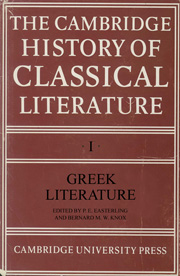Book contents
- Frontmatter
- 1 Books and readers in the Greek world
- 2 Homer
- 3 Hesiod
- 4 The epic tradition after Homer and Hesiod
- 5 Elegy and iambus
- 6 Archaic choral lyric
- 7 Monody
- 8 Choral lyric in the fifth century
- 9 Early Greek philosophy
- 10 Tragedy
- 11 The satyr play
- 12 Comedy
- 13 Historiography
- 14 Sophists and physicians of the Greek enlightenment
- 15 Plato and the Socratic work of Xenophon
- 16 Oratory
- 17 Aristotle
- 18 Hellenistic poetry
- 19 Post-Aristotelian philosophy
- 20 The literature of the Empire
- 21 Epilogue
- Appendix of authors and works
- Metrical appendix
- Works Cited in the Text
- References
9 - Early Greek philosophy
Published online by Cambridge University Press: 28 March 2008
- Frontmatter
- 1 Books and readers in the Greek world
- 2 Homer
- 3 Hesiod
- 4 The epic tradition after Homer and Hesiod
- 5 Elegy and iambus
- 6 Archaic choral lyric
- 7 Monody
- 8 Choral lyric in the fifth century
- 9 Early Greek philosophy
- 10 Tragedy
- 11 The satyr play
- 12 Comedy
- 13 Historiography
- 14 Sophists and physicians of the Greek enlightenment
- 15 Plato and the Socratic work of Xenophon
- 16 Oratory
- 17 Aristotle
- 18 Hellenistic poetry
- 19 Post-Aristotelian philosophy
- 20 The literature of the Empire
- 21 Epilogue
- Appendix of authors and works
- Metrical appendix
- Works Cited in the Text
- References
Summary
PHILOSOPHICAL POETS AND HERACLITUS
Three early Greek philosophers were poets, Xenophanes, Parmenides and Empedocles. Heraclitus, who lived at about the same time, was a philosopher whose prose is stylistically unique in Greek literature. These are the earliest philosophical writers whose work, though fragmentary, has been preserved in some quantity. It would have been possible for them to express their thought in a ‘simple and economical’ prose, as Anaximenes, who was older than any of them, is reputed to have done (Diog. Laert. 2.3). But Anaximenes is one of the first Greeks who is known to have written a book in prose. His philosophical predecessor at Miletus, Anaximander, did so too, and Theophrastus commented on the ‘somewhat poetical’ style of his single extant fragment (DK12 A 9). There is no reason to suppose that the philosophical poets surprised their contemporaries by declining to follow a prose tradition of such recent origin.
Equally, however, their use of verse rather than prose was deliberate. Each of the philosopher poets must be considered as an individual writer, but it may be significant that Parmenides and Empedocles (and Xenophanes during his later years) belonged not to Ionia but to the western Greek world of southern Italy and Sicily. Parmenides ‘wrote as a philosophical pioneer of the first water’ and probably confined his recognition of the prose philosophers of Ionia to critical rejection of their views. The Ionian philosophers (excluding Xenophanes) differentiated themselves from traditional authorities by writing in prose. As hexameter poets Xenophanes, Parmenides and Empedocles placed themselves in a line which had Homer and Hesiod as its illustrious founders.
- Type
- Chapter
- Information
- The Cambridge History of Classical Literature , pp. 245 - 257Publisher: Cambridge University PressPrint publication year: 1985
References
- 1
- Cited by



